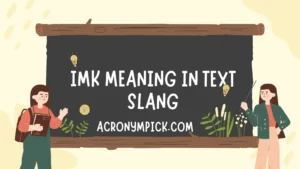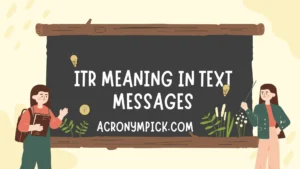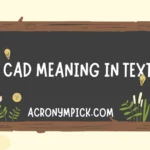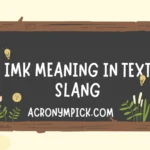Texting and online communication have developed a language of their own. From acronyms to abbreviations, staying up to date is important if you want to keep up with conversations—especially on social media, in chats, or in forums. One term that occasionally pops up is IDF. If you’ve ever seen this and wondered, “What does IDF mean in text?”, you’re not alone.
This article dives deep into the meaning, usage, origins, and contexts of IDF in texting, helping you understand what it means, when it’s used, and how to respond if someone texts you “IDF.”
What Does IDF Mean in Text?
In the context of text messaging, IDF usually stands for:
“I Don’t Feel”
It’s an abbreviation used to express emotional detachment, disinterest, or the idea that someone is just not emotionally affected by something.
🔍 Example:
- Friend: “Did you see what she posted?”
- You: “Yeah, IDF anymore. She’s always dramatic.”
In this example, IDF means the person is no longer emotionally reactive or interested in someone else’s behavior. It reflects emotional distance, often used in a casual or dismissive way.
Other Possible Meanings of IDF in Texting
While “I Don’t Feel” is the most common texting meaning, IDF can have alternate meanings based on the context:
- I Don’t F* (explicit)** – Crude or direct, sometimes used to establish boundaries.
- I Define Freedom – Rare, used in motivational or expressive texts.
- Israeli Defense Forces – Not a texting slang, but often seen in news or political discussions.
💡 Pro Tip: Always look at context, tone, and who you’re talking to. If it’s a casual chat, “I Don’t Feel” is the likely meaning. In political or news-focused groups, it could mean “Israeli Defense Forces.”
Where Did IDF Come From?
The slang version of IDF, meaning “I Don’t Feel”, likely originated from online forums, memes, and Twitter culture, where people often compress thoughts into quick, bite-sized reactions.
It gained popularity in:
- Gen Z slang
- Stan culture (fandom lingo)
- Mental health expression spaces, like Tumblr or Twitter threads
As social media began favoring emotional transparency mixed with dry humor, IDF became a shorthand way to express emotional numbness, indifference, or the act of setting boundaries.
How IDF Is Used in Different Contexts
💬 In Friend Conversations
Used to detach from drama or negativity:
“She said we’re not real friends. IDF anymore.”
🧠 In Mental Health-Related Posts
Sometimes used to express emotional burnout or numbness:
“I’ve been through so much, IDF things like I used to.”
🎭 In Online Debates
Used to express a blunt refusal to be affected by online negativity:
“People hating on me for no reason. IDF lol.”
🛑 In Setting Boundaries
Some use IDF as a way to emotionally disconnect from toxic relationships or repeated patterns:
“He keeps coming back, but IDF this time.”
Tone and Emotional Meaning Behind IDF
The tone of “IDF” can vary based on how it’s used:
| Tone | Implication |
|---|---|
| Casual | “I’m over it” |
| Sarcastic | “I’m pretending I don’t care” |
| Serious | “I’m emotionally drained” |
| Defensive | “I’m distancing myself” |
The acronym gives off an emotionally detached vibe, but it can hide deeper emotions underneath, like:
- Disappointment
- Burnout
- Indifference as a coping mechanism
Understanding the tone and context is key when reading or replying to IDF.
IDF in Social Media Culture
On platforms like Twitter, TikTok, and Instagram, IDF is often part of a trend of short, emotionally expressive acronyms.
You’ll see phrases like:
- “IDF no more.”
- “IDF and it feels good.”
- “IDF about anyone’s opinion anymore.”
These are often posted with:
- Reaction memes
- GIFs
- Screenshots of chats
This shows how text abbreviations are now part of social media storytelling—they convey mood, tone, and emotion without saying too much.
Common Misunderstandings About IDF
❌ It’s Not Always About Politics
Some confuse IDF with the Israeli Defense Forces, especially in international conversations. While that’s a valid meaning, it’s rare in casual texting unless you’re discussing politics or global events.
❌ It’s Not Just Coldness
While IDF sounds emotionless, it’s often used as emotional armor—a way for people to protect themselves or express emotional fatigue.
❌ It Doesn’t Mean You’re Heartless
Using IDF doesn’t mean someone lacks empathy. It could simply mean they’re emotionally exhausted or drawing boundaries.
How to Reply When Someone Says IDF
If someone texts you “IDF,” your response depends on the context:
- Friend dealing with drama?
👉 “Totally get it. Protect your peace.” - Emotional burnout?
👉 “Take your time. I’m here if you ever do feel.” - Sarcastic tone?
👉 “LMAO same, IDF either.”
Matching tone while offering empathy (when needed) is the best move.
Alternatives to IDF in Texting
Here are some similar phrases or acronyms that convey the same or similar meaning:
| Acronym/Phrase | Meaning |
|---|---|
| IDC | I Don’t Care |
| IDGAF | I Don’t Give A F*** |
| Meh | Indifference or apathy |
| Over it | Done with the situation |
| I’m numb | Emotional exhaustion |
| Whatever | Dismissive or uninterested |
Frequently Asked Questions (FAQ)
1. What does IDF stand for in texting?
In texting, IDF usually stands for “I Don’t Feel”, expressing emotional detachment or burnout.
2. Is IDF the same as IDC?
Not exactly. IDC means “I don’t care” (more about thoughts or opinions), while IDF means “I don’t feel” (emotionally disconnected).
3. Can IDF mean Israeli Defense Forces in a text?
Yes, but only if the conversation is about politics or military topics. In casual chat, it usually doesn’t.
4. Is IDF a bad or rude text to send?
Not inherently. It depends on the tone. Sometimes it shows healthy emotional boundaries or detachment from drama.
5. Should I use IDF in professional settings?
No. It’s considered too casual or emotionally loaded for professional or formal communication.
6. Where did IDF slang come from?
Most likely from Gen Z internet culture, especially on platforms like Twitter, Tumblr, and Reddit.
7. What does it mean if someone keeps saying IDF?
They may be emotionally overwhelmed, avoiding conflict, or expressing burnout. Check in if you’re concerned.
Conclusion
In the world of online communication, acronyms like IDF have become powerful tools to express emotional states with just a few letters. Most commonly meaning “I Don’t Feel,” IDF is a way for people—especially younger users—to set emotional boundaries, react to drama, or show they’re mentally checking out of a situation.
Understanding the meaning and context of IDF helps you become a better digital communicator. Whether you’re navigating friendship chats, social media threads, or emotional conversations, knowing when and how IDF is used gives you clarity and confidence.
As with all texting slang, tone and intent are everything. So the next time someone drops “IDF” in your inbox, you’ll know exactly what they’re trying to say—even when they’re not saying much at all.












